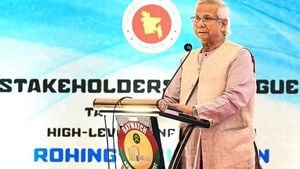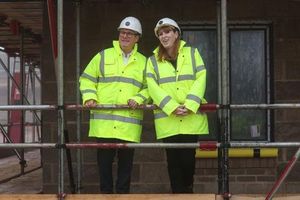Christopher Columbus has long been celebrated as the discoverer of the Americas, but new research is set to reshape how we view this iconic figure from history. A groundbreaking DNA study reveals evidence supporting the notion of Columbus having Sephardic Jewish ancestry, shifting the narrative from the traditional view of his Italian origins to one rooted deeply within the Jewish community of medieval Spain.
Conducted by Spanish scientists and featured prominently in the documentary Columbus DNA: The True Origin, this extensive study spanned nearly 22 years, examining Columbus's remains believed to be interred at Seville Cathedral. The findings showcase genetic markers from Columbus’ partial DNA, alongside samples obtained from his son, Hernando Colón, indicating their reflection of Jewish lineage.
Historically, Columbus was thought to have been born around 1451, with many attributing his origins to Genoa, Italy. Yet, as inquiries continued, theories expanded, with suggestions ranging from Greek, British, to even Sephardic Jewish heritage. The new evidence, presented by forensic expert Miguel Lorente, challenges the centuries-old assumption and aligns with substantial historical records showing significant Jewish populations residing in Spain before the infamous expulsion of 1492.
Reports highlight the irony of Columbus’s Jewish heritage coinciding with the very same year the Catholic monarchs Ferdinand and Isabella expelled Jews and Muslims from Spain, marking the end of about fifteen hundred years of their existence on the Iberian Peninsula. Lorente pointed out, "We have DNA from Christopher Columbus, very partial, but sufficient for our purposes. Both the Y chromosome and mitochondrial DNA exhibit traits compatible with Jewish origin."
This genetic investigation sheds light not just on Columbus’s background but also paints him as potentially someone who converted to Catholicism or concealed his true identity to escape persecution. It’s known historically, as well, around 300,000 Jews who faced the forced choice of conversion or exile went on to establish significant communities throughout the globe, often dramatically shifting the course of cultural and academic life wherever they resettled.
The inquiry also attempted to ascertain Columbus’s birthplace through DNA analysis of his remains, allowing researchers to narrow down potential locations. While definitive conclusions about birthplace elude the scientists, speculations lean heavily toward Western Europe, possibly Valencia, Spain.
Some might question how this newly uncovered heritage affects Columbus’s legacy. Columbus is often vilified for his brutal treatment of the indigenous populations encountered during his voyages, which included enslavement and the introduction of European diseases leading to high mortality among native people. His actions have raised questions of his accountability and whether he should remain celebrated or condemned. Critics argue, pointing to historical evidence, stating he sanctioned severe punitive measures against native populations, including the infamous cutting off of hands for not meeting gold quotas.
Despite the deep-rooted controversy surrounding Columbus, the revelations about his ancestry add another layer to his complex legacy. By examining the past through this new lens, we are reminded of the era's multiculturalism and its responsibilities: the coexistence of different beliefs and identities.
This newfound aspect of Columbus's identity adds depth to how we may view figures from history. Moving forward, society may have to weigh the nuances of heritage and actions, opening debates not just about Columbus but also how historical narratives are shaped. Should we reassess how we tell the story of exploration, conquest, and the individuals behind those tales?
Whether these revelations will lead to fresh perspectives on Columbus’s achievements or renewed calls for accountability remains to be seen. One thing is clear: DNA research continues to alter the way we understand the historical figures who have shaped our world, promoting dialogue about identity, belonging, and the legacy of colonialism. Understanding Columbus's complex identity provides opportunities to not only re-evaluate his legacy but also reinforce the importance of recognizing the amalgam of histories interwoven within the fabric of nations.
Columbus's tale is one entrenched within the larger struggles of identity against the backdrop of 15th-century Spain, where numerous identities collided and shaped the modern world. The narrative of Columbus—now viewed through the complicated lens of his Jewish ancestry—invites us to reconsider preconceived notions and explore the rich intersections of culture and history.



